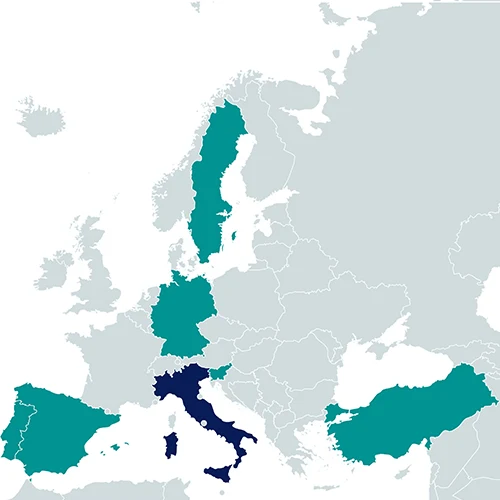2023-03-01 to 2026-02-28
Approx. 1,4 mil. EUR
Prof. Paolo Ciucci
-
Department of Biology and Biotechnologies “Charles Darwin”, Sapienza University of Rome, Rome, Italy
-
Center for Wildlife Genetics, Senckenberg Society for Nature Research, Frankfurt, Germany
-
Human Biology and Primate Cognition Research Group – Institute of Biology, University of Leipzig, Leipzig, Germany
-
Nature and Agricultural Resources Conservation’s Office, Appennino Tosco-Emiliano National Park, Ligonchio, Italy
-
Institute of Applied Ecology, Rome, Italy
-
Department of Monitoring and Protection of the Environment and for Biodiversity Conservation, Italian Institute for Environmental Protection and Research, Rome, Italy
-
Department of Forest Ecology and Biogeochemical Fluxes, Research and Innovation Centre – Edmund Mach Foundation, San Michele all’Adige, Italy
-
CIBIO/InBIO – Research Center in Biodiversity and Genetic Resources, BIOPOLIS, Vairão, Portugal
-
Department of Biology – Biotechnical Faculty, University of Ljubljana, Ljubljana, Slovenia
-
Department of Biodiversity and Environmental Management, University of León, Léon, Spain
-
Department of Ecology and Evolution, Doñana Biological Station, Seville, Spain
-
Gothenburg Research Institute, University of Gothenburg, Gothenburg, Sweden
-
Environmental Psychology – Department of Architecture and Built Environment, Lund University, Lund, Sweden
-
Department of Molecular Biology and Genetics, Koç University, Istanbul, Türkiye

Anthropogenic hybridization (AH) threatens global biodiversity conservation. Especially when involving domesticated animals, artificially selected for genetically determined morphological, physiological, and behavioural traits, AH might have deleterious effects for the genomic integrity and viability of wild populations. WOLFNESS aims to enhance the wolf (Canis lupus) conservation status in light of its on-going recolonization of human-dominated landscapes, where wolf-dog hybridization (WDH) risk might be high. Due to lack of knowledge and methodological standardization, social awareness, technical difficulties, and unclear provisions by the main legal instruments on nature conservation, WDH has not been systematically investigated and its management has hardly made any progress.
Through a multidisciplinary network of researchers working in a conservation biology context, WOLFNESS promotes the application of novel genetic, genomic, demographic, and behavioural approaches to provide science-based support for effective and socially acceptable WDH management. The main objectives are: a) standardizing genetic and analytical procedures for the unambiguous identification of early-generation hybrids, b) establishing sampling and analytical procedures to estimate admixture, c) quantifying admixture in selected European wolf populations; d) investigating the phenotypic effects of dog introgression in wolves, e) evaluating management alternatives to address WDH, f) assessing perceptions of WDH and the social acceptability of management options, and g) evaluating the efficacy of current EU policies in addressing WDH.
Developing tools to assess and monitor WDH in European wolf populations. WOLFNESS promotes sharing expertise among different genetic labs to reliably detect admixed individuals. Sampling issues will also be addressed to quantify admixture in selected European wolf populations.
Assessing phenotypic effects of introgression in wolves. WOLFNESS adopts whole genome sequencing to estimate the effects of admixture on behaviour, life-history traits, ecology, and interactions with humans, using both controlled experiments with captive wolf-dog hybrids, and field work techniques.
Evaluating alternative management strategies and their social acceptability. Through literature reviews, field work, and population modelling, WOLFNESS evaluates the technical feasibility and expected efficacy of alternative WDH management strategies. By complementing psychological and anthropological approaches, WOLFNESS also recognizes different actors, elaborating on how to increase awareness and maximize social acceptance of more effective WDH management.
Stakeholder engagement, policy impact and outreach. WOLFNESS findings will be relevant for the Bern Convention and fuel progress for the conservation of Large Carnivores in the frame of the European Commission and its Habitats Directive, providing technical and policy support at the European and national levels, and interacting with the main stakeholders and informing the general public.